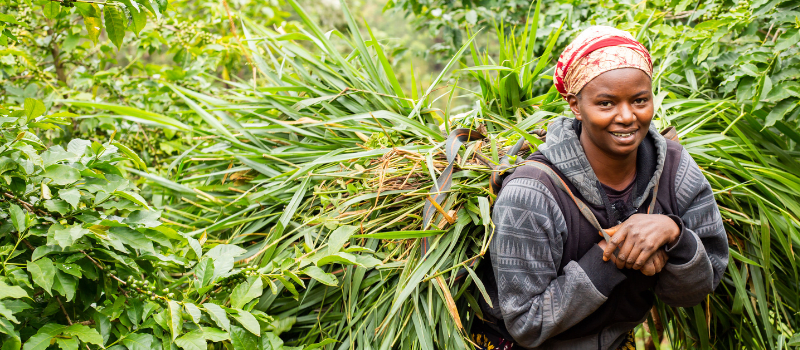This blog was written by Tanja Kisslinger, Advocacy and Communications Technical Advisor at VWB/VSF in reflection of a trip taken to Kenya in July 2024 to document our Volunteers Engaged in Gender-Responsive Technical Solutions (VETS) program.
In the lush highlands of Nyeri County, Kenya, the sun rises early over the village of Gathiriti, signaling the start of a long day for Ruth Wakariti and her husband, Elias Goturuma. For this couple, like many others in rural Kenya, dairy farming is not just an occupation—it's a way of life. Thanks to the support of Wakulima Dairy and VWB’s VETS program, they’ve been able to improve their farm practices and increase their economic prospects.
A Day in the Life
Ruth, who leads the Gathiriti Dairy Farmers Group, begins her day before dawn, at 5 a.m. sharp. Her routine includes feeding and milking their four cows, cleaning the stalls, and preparing forage, all before the family’s seven children awaken for school. By mid-morning, Ruth and Elias are busy cutting and carrying forage—lush crops like Napier grass, Brachiaria, sweet potatoes, and newly introduced arrowroot and corn—back up the hill to feed their cows. The physical labor is immense, but it's a critical part of their daily rhythm.
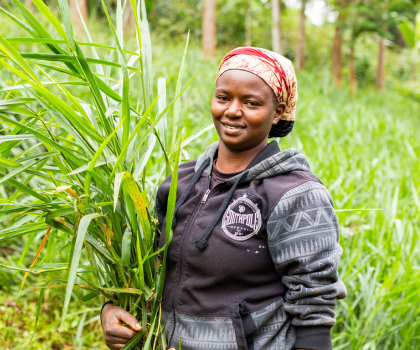 PHOTO: Ruth collecting high-quality forage.
PHOTO: Ruth collecting high-quality forage.
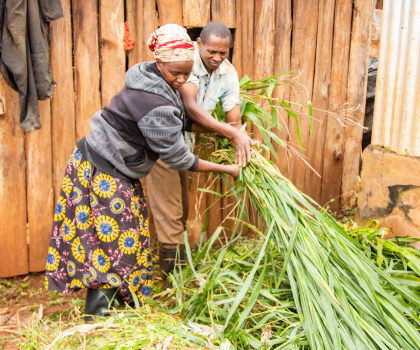 PHOTO: Ruth and Elias feeding Napier into the chopper.
PHOTO: Ruth and Elias feeding Napier into the chopper.
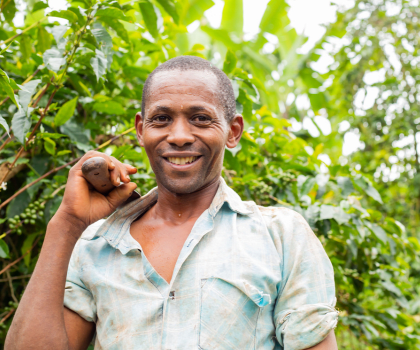 PHOTO: Elias is the Chair of several Farmer Groups.
PHOTO: Elias is the Chair of several Farmer Groups.
Through their partnership with Wakulima Dairy Limited, a dairy cooperative in Nyeri County, Ruth and Elias can sell their milk to nearby processors. Founded in 1990, Wakulima Dairy started as a self-help group with the goal of collecting and marketing members' milk. Today, the cooperative provides invaluable support to smallholder farmers like Ruth and Elias by ensuring their milk reaches the market efficiently.
Women at the Heart of Farming in Kenya
“Rest?” Ruth says with a laugh. “There is no rest. Even when the farm work is done, there is always more—cooking, cleaning, taking care of the children, harvesting coffee, preparing meals.” This constant cycle of work, from early morning until late at night, is the reality for women farmers in rural Kenya, who make up more than 70% of the agricultural workforce. Balancing farm responsibilities with household duties requires endless energy, and it is a challenge that many women face daily.
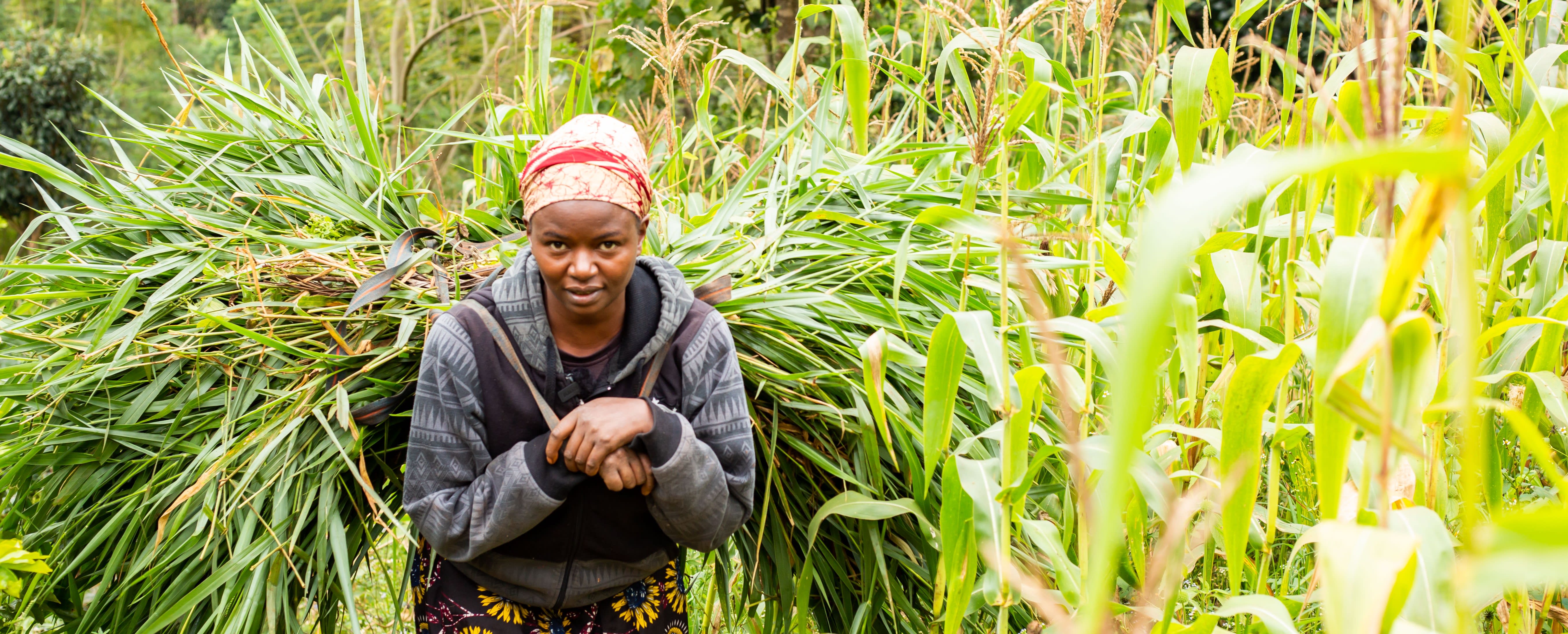 PHOTO: Ruth carries a massive bundle of forage on her back, and climbs up a steep hill, back to the farm. She must perform this heavy climb several times each day.
PHOTO: Ruth carries a massive bundle of forage on her back, and climbs up a steep hill, back to the farm. She must perform this heavy climb several times each day.
Despite women’s significant role in dairy farming, they often remain confined to production-level tasks, which yield lower economic returns. VWB’s VETS program is working to address this disparity. In Kenya, the project partners with two key dairy cooperatives—Wakulima and Meru Dairies—to enhance employment opportunities for women. By providing targeted training and support, the VETS program helps women gain access to more profitable segments of the dairy value chain and opens doors for them to take on leadership roles in the industry.
Growing a Sustainable Farm
Ruth and Elias’ farm is typical of rural dairy farms in Kenya. When they first moved to Gathiriti in 2011, they began with just one cow and two bulls. Ruth quickly realized that dairy farming had the potential to be more lucrative than she had anticipated, leading them to sell one of the bulls and invest in additional cows. Over time, they expanded their forage crops and improved their farming practices, thanks in large part to the training provided by the VETS program and their collaboration with Wakulima Dairy.
Through VETS, Ruth and Elias gained access to training that supports the sustainable development of their farm. The program has been instrumental in bridging the skills gap prevalent in Kenya’s dairy sector, equipping farmers with the tools and knowledge needed to thrive in a competitive market.
The Impact of VETS Training
“The training has been so important for our farm,” Ruth explains. “I’ve learned about calf rearing, cow comfort, fodder management, and biosecurity, all of which have helped improve our milk production.” After receiving guidance from Dr. Muller Fotsac, a VETS volunteer, Ruth and Elias made several key changes to their farm. They introduced new forage crops, built separate calf spaces, and improved cow comfort by updating the stalls and increasing the quality of feed.
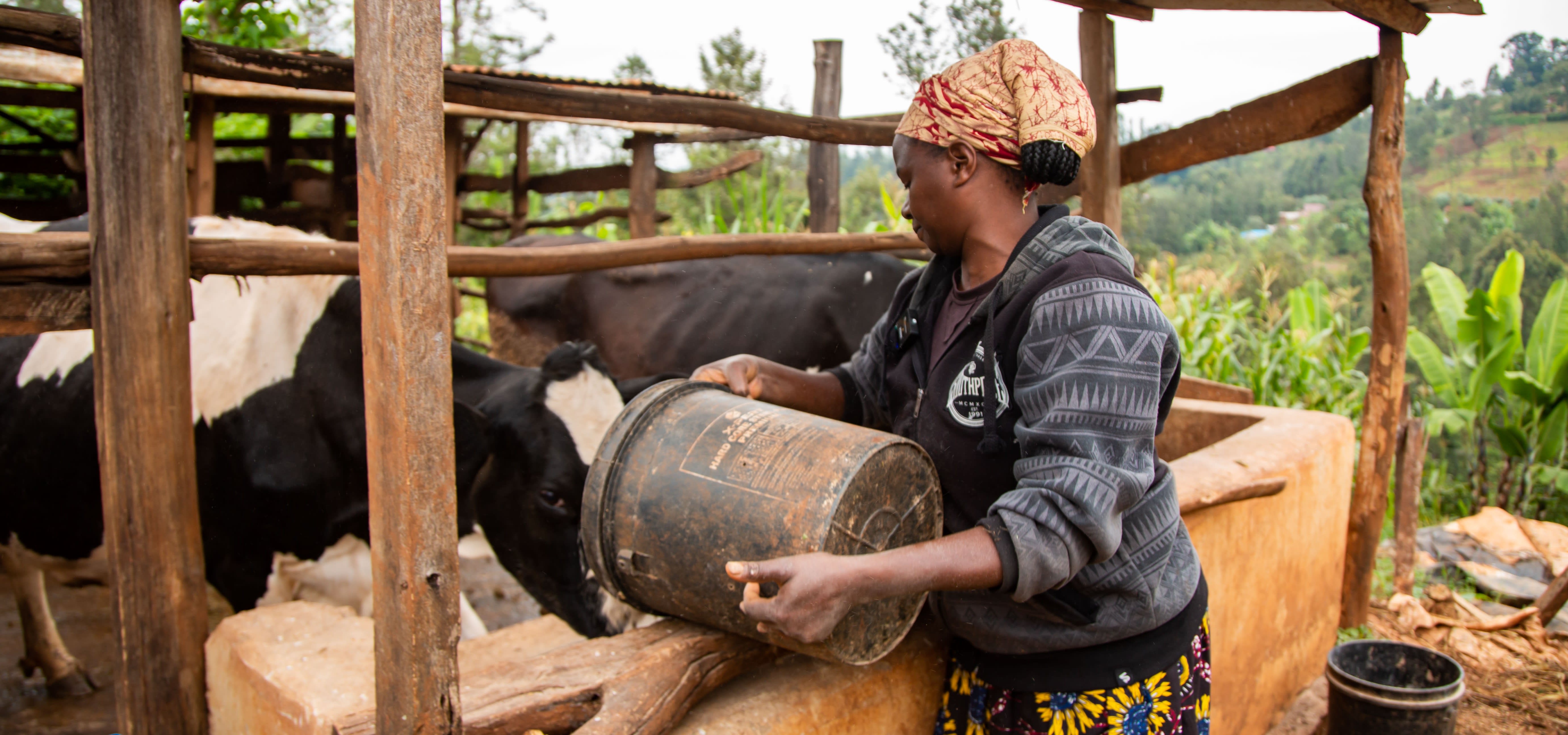 PHOTO: Ruth adds a nutrient-rich meal and mineral supplement to her cows' feed, crucial to balancing cow nutrition and improving milk production.
PHOTO: Ruth adds a nutrient-rich meal and mineral supplement to her cows' feed, crucial to balancing cow nutrition and improving milk production.
One of the most impactful changes was following the dry cow protocol they learned from the VETS training. Ruth shared, “After learning about dry cow management from a VETS training, we decided to implement it with our Heifer. We made sure to give her a rest period before calving and provided her with the right nutrition and comfort during this time. As a result, her milk production increased from 20 liters to almost 30 liters per day.”
This kind of support is essential for rural families who depend on dairy farming for both nutrition and income. In Kenya, milk and dairy products are a primary source of food security, providing nourishment for millions of people. For families like Ruth and Elias’, improvements in dairy production directly impact their livelihoods and overall well-being.
Sharing the Workload
Ruth and Elias work together to maintain the farm, sharing tasks like feeding the cows and transporting milk to the collection point. “Working alongside Ruth has shown me the value of sharing responsibilities,” Elias says. “It’s not just about farming; it’s about supporting each other and setting an example for our children.”
While Ruth and Elias work side by side on the farm, Ruth admits that other household chores—cooking, cleaning, childcare—remain solely her responsibility. “It’s not customary for men to do these things,” she explains, “but Elias will help if I’m ill or away for a meeting. Things are changing, but slowly.”
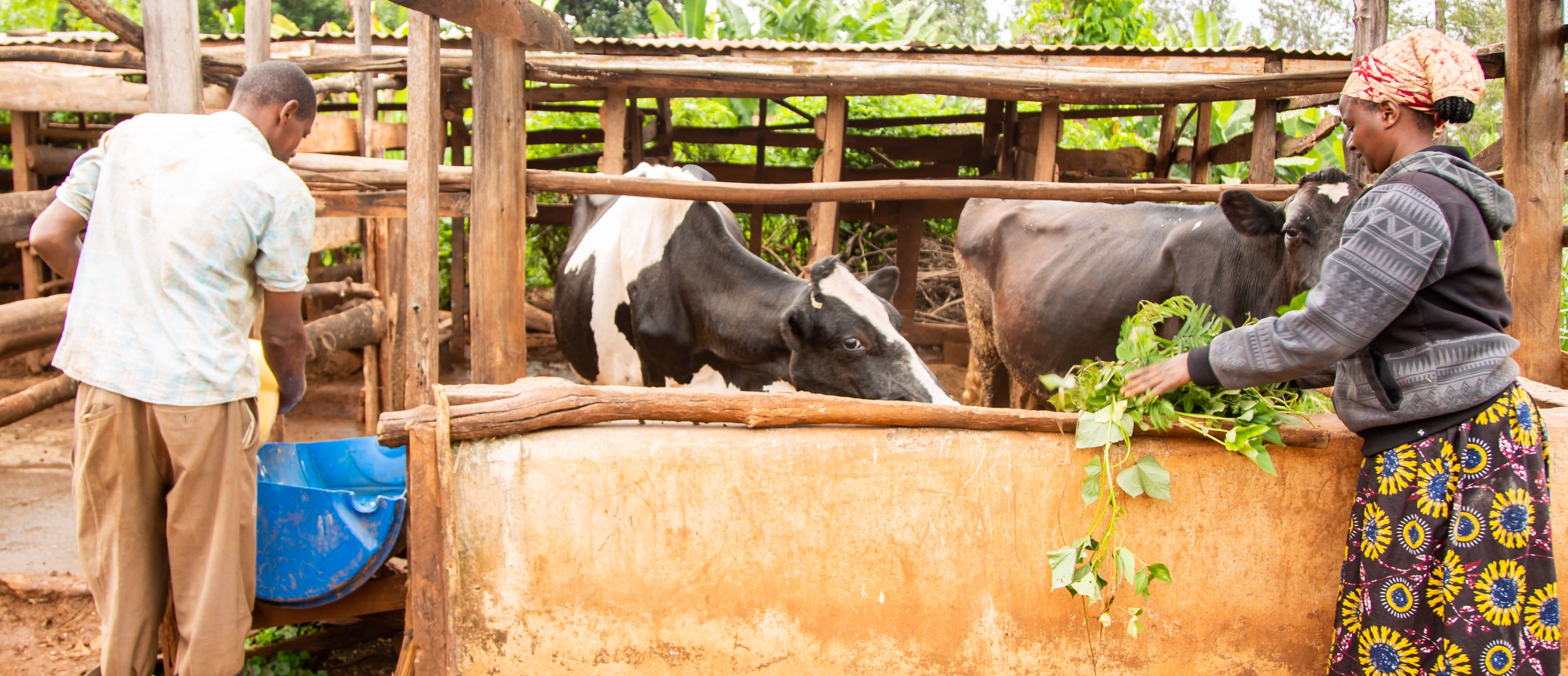 PHOTO: Elias refills the cow's water tank while Ruth adds sweet potato vines to the cow's feed bunker.
PHOTO: Elias refills the cow's water tank while Ruth adds sweet potato vines to the cow's feed bunker.
Women in Leadership Roles
Across Kenya, gender equality in farming is gradually evolving. Women like Ruth are taking on leadership roles, not just in their own farms, but in their communities. As a Lead Farmer, Ruth shares the knowledge and skills she’s gained with her neighbors, contributing to a growing network of empowered women farmers who are changing the face of agriculture in Kenya. Through programs like VETS, women are being linked more directly to milk markets and are encouraged to take on supervisory roles within family-owned farms, increasing their economic returns.
Challenges Facing Women Dairy Farmers
Despite the progress, the reality for women dairy farmers remains challenging. According to the Food and Agriculture Organization (FAO), women in rural Kenya often face barriers in accessing credit, land, and resources, which limits their productivity and income potential. This is compounded by the fact that women typically shoulder the burden of both farm work and household chores, as Ruth’s story vividly illustrates. VETS aims to address these barriers by increasing women’s access to dairy inputs and facilitating their inclusion in profitable segments of the dairy value chain, supporting Kenya’s Vision 2030 development strategy.
Dreams for the Future
But for Ruth, the hard work is worth it. Her dream is to one day open a milk shop with Elias, providing a steady cash flow that would allow them to further invest in their farm and support their children’s education. “Self-employment is empowering,” she says. “I love being able to work at what I choose because I love it, not because someone is telling me what to do.”
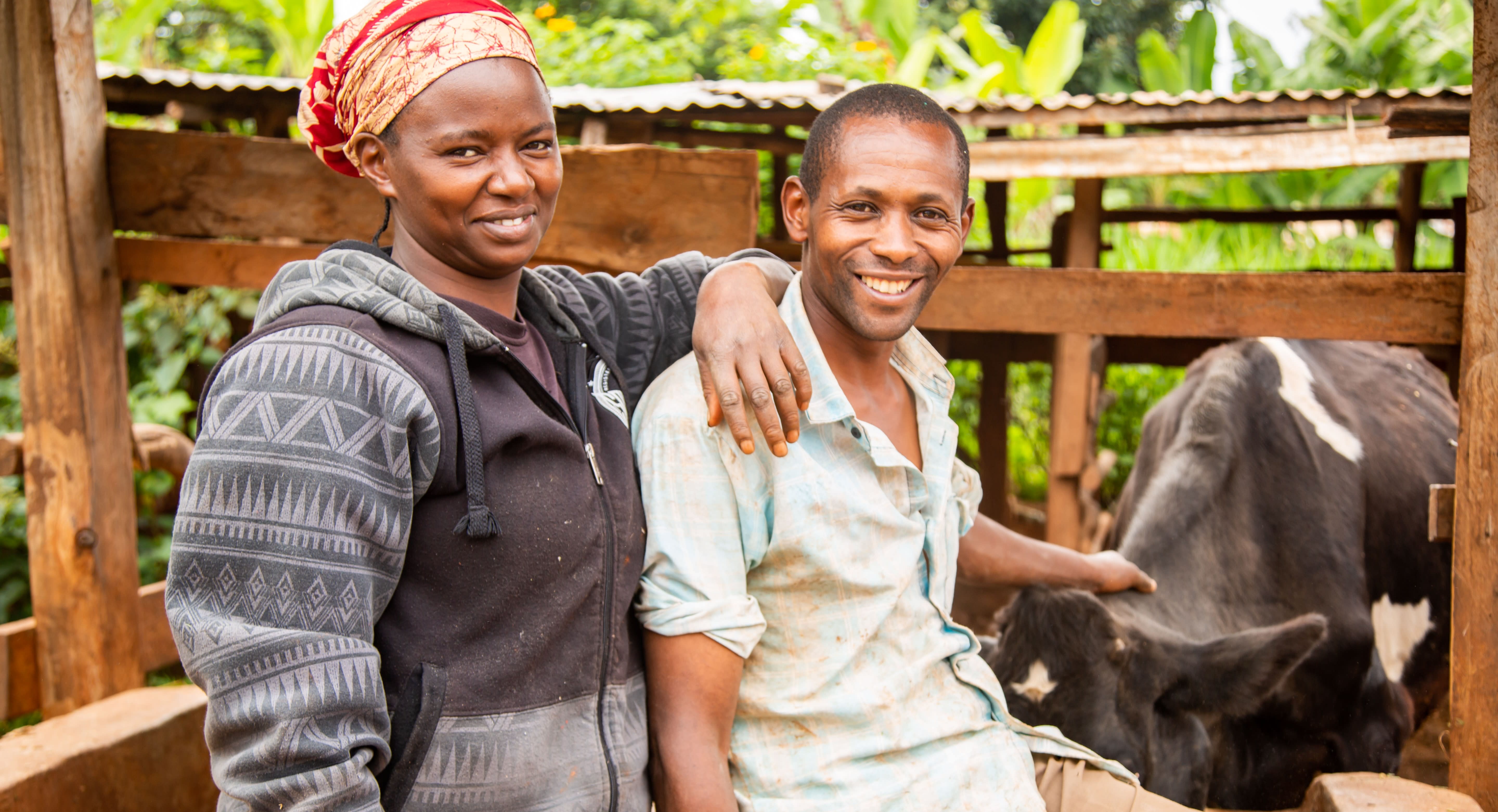 PHOTO: Ruth believes that a woman's success in dairy farming comes from balance—between home and work—with support from one's husband being essential.
PHOTO: Ruth believes that a woman's success in dairy farming comes from balance—between home and work—with support from one's husband being essential.
A Shared Commitment to the Future
Ruth and Elias’ story is a testament to the power of knowledge and shared commitment. With the support of the VETS program and Wakulima Dairy, they have not only improved their farm's productivity but also strengthened their partnership, setting an example for their children and their community. As Ruth continues to lead, and as Elias continues to support her, their farm stands as a symbol of the resilience, dedication, and potential of women dairy farmers in Kenya.
VETS is an 8-year initiative (2020-2028) to improve the economic and social well-being of marginalized people, particularly women and girls, in 6 countries across Africa and Asia. In collaboration with local partners, the program is implemented through 190 Canadian volunteers on international assignment and is generously funded by Global Affairs Canada. Learn more.

